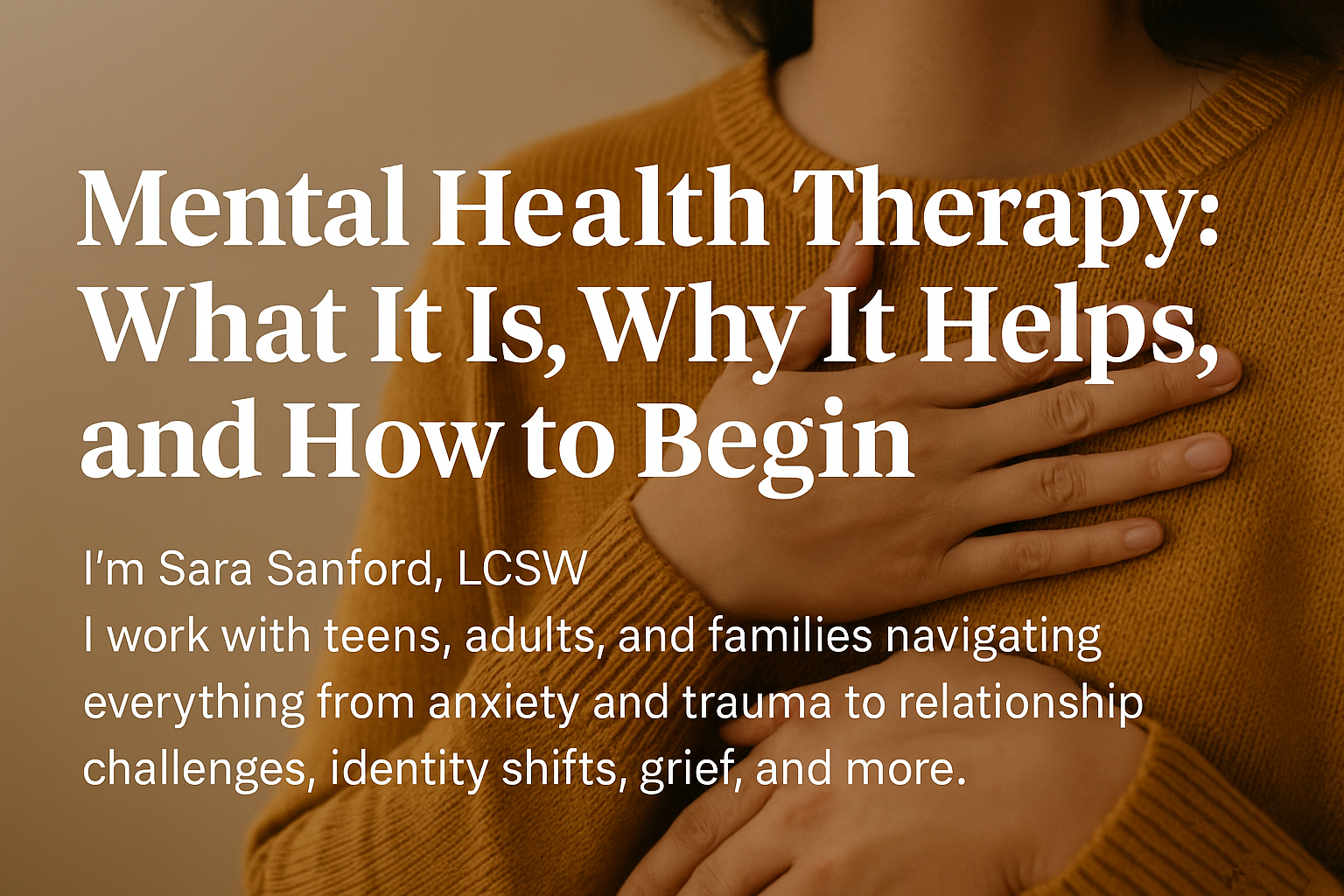Teen years are anything but easy. Adolescents today are growing up in a world that feels more overwhelming than ever—between academic pressures, social dynamics, family expectations, and digital overload, it’s no wonder so many teens feel anxious, withdrawn, or simply “not like themselves.”
As a therapist who has worked with countless teens and their families, I want to start by saying: If your teen is struggling, you’re not alone—and neither are they.
Why Therapy for Teens Matters
Adolescence is a time of massive growth, both physically and emotionally. It’s also when many mental health conditions first start to show up. Depression, anxiety, identity exploration, social challenges, trauma responses, and even emerging self-harm behaviors often appear during these years.
But here’s the good news: Therapy can make a meaningful difference.
Therapy offers a non-judgmental, confidential space where teens can:
- Talk openly about what’s bothering them
- Explore emotions and learn to regulate them
- Build communication and conflict-resolution skills
- Learn coping strategies for anxiety, depression, and stress
- Strengthen self-esteem and resilience
Whether your teen is facing a specific issue or just needs help navigating life in general, counseling gives them tools that can empower them well beyond the therapy room.
My Approach to Working with Teens
I bring a mix of structure, compassion, and humor into my sessions—along with deep respect for each teen’s individuality. Building trust is key. I never assume what a teen needs based on age, gender, or diagnosis. Instead, I take the time to really listen, understand their unique challenges, and co-create goals they feel invested in.
Therapy with teens often involves creative techniques like:
- Narrative work – Helping them rewrite the story they tell themselves about who they are
- CBT (Cognitive Behavioral Therapy) – Teaching them how to shift unhelpful thought patterns
- Mindfulness & grounding – Useful for emotional regulation and managing anxiety
- Family support sessions – When appropriate, I involve parents/guardians to help strengthen communication and home support
Each teen is different, and so each treatment plan is personalized.
Learn more about the individual therapy services I offer, and how I adjust the work to be age-appropriate and developmentally attuned.
Common Reasons Teens Come to Therapy
Here are just some of the issues teens and adolescents come to therapy to work through:
- Academic stress, test anxiety, and perfectionism
- Social anxiety or peer difficulties
- Body image and eating concerns
- Depression, low energy, and withdrawal
- Emotional outbursts or irritability
- Self-harming behaviors
- Grief or loss
- Divorce, parental separation, or family conflict
- Identity exploration (LGBTQIA+, gender, racial/cultural identity)
- Trauma (recent or childhood)
- Bullying and online harassment
- Trouble with transitions (school, college prep, moving, etc.)
If any of these sound familiar, you can reach out here to set up a free consultation.
What Teens Say About Therapy (in their words)
Therapy isn’t about adults talking at teens—it’s a space where teens feel seen. I often hear things like:
“This is the only place I can be myself.”
“It helps to talk to someone who isn’t going to freak out.”
“I’ve learned that feelings don’t make me weak.”
Sometimes, just having that one person outside of their immediate family or peer group—someone who listens without judging—can be life-changing.
How Parents and Caregivers Can Support the Process
While therapy is confidential, I always encourage collaborative care when appropriate. I can help parents understand what their teen might be experiencing and offer tools for supporting them at home.
- Regular check-ins or family sessions can help bridge communication gaps
- I can offer guidance on managing boundaries and expectations
- Sometimes parents need their own support—I offer care coordination too
You’re not expected to have all the answers. But just by reaching out, you’re showing your teen that their emotional well-being matters.
Online Teen Therapy: Safe and Convenient
Many teens are more comfortable in digital spaces. That’s why I offer online therapy for teens, which can be just as effective as in-person sessions. It’s private, secure, and flexible—whether your teen prefers meeting from home or needs support during a busy school week.
When Therapy Makes a Difference
The teen years don’t have to feel like a rollercoaster. With the right tools and support, teens can learn to trust themselves, advocate for what they need, and navigate life with more confidence.
If your teen is:
- Crying more than usual
- Avoiding school or social situations
- Saying things like “I just don’t care anymore”
- Lashing out or shutting down
- Asking for help (even subtly)
It might be time to consider therapy.
Therapy Can Be a Lifeline
I’ve watched teens go from feeling hopeless to hopeful, confused to clear, stuck to strong. And while the process isn’t always easy, it’s deeply worth it.
If you’re wondering where to begin, start here. You can also read more about my therapy approach and how I integrate different methods to fit each teen.
And if your teen is navigating something more complex—like trauma, substance use, or family transition—we can talk about more specialized support too. Check out trauma therapy, veteran & substance support, or divorce & co-parenting services.
Let’s Connect
You don’t have to figure this all out alone. Whether you’re a parent seeking help for your teen, or a teen reading this yourself—reach out. Therapy is a space where healing begins, and growth is absolutely possible.Contact me here for a consultation or to ask questions about how therapy might support your teen.




